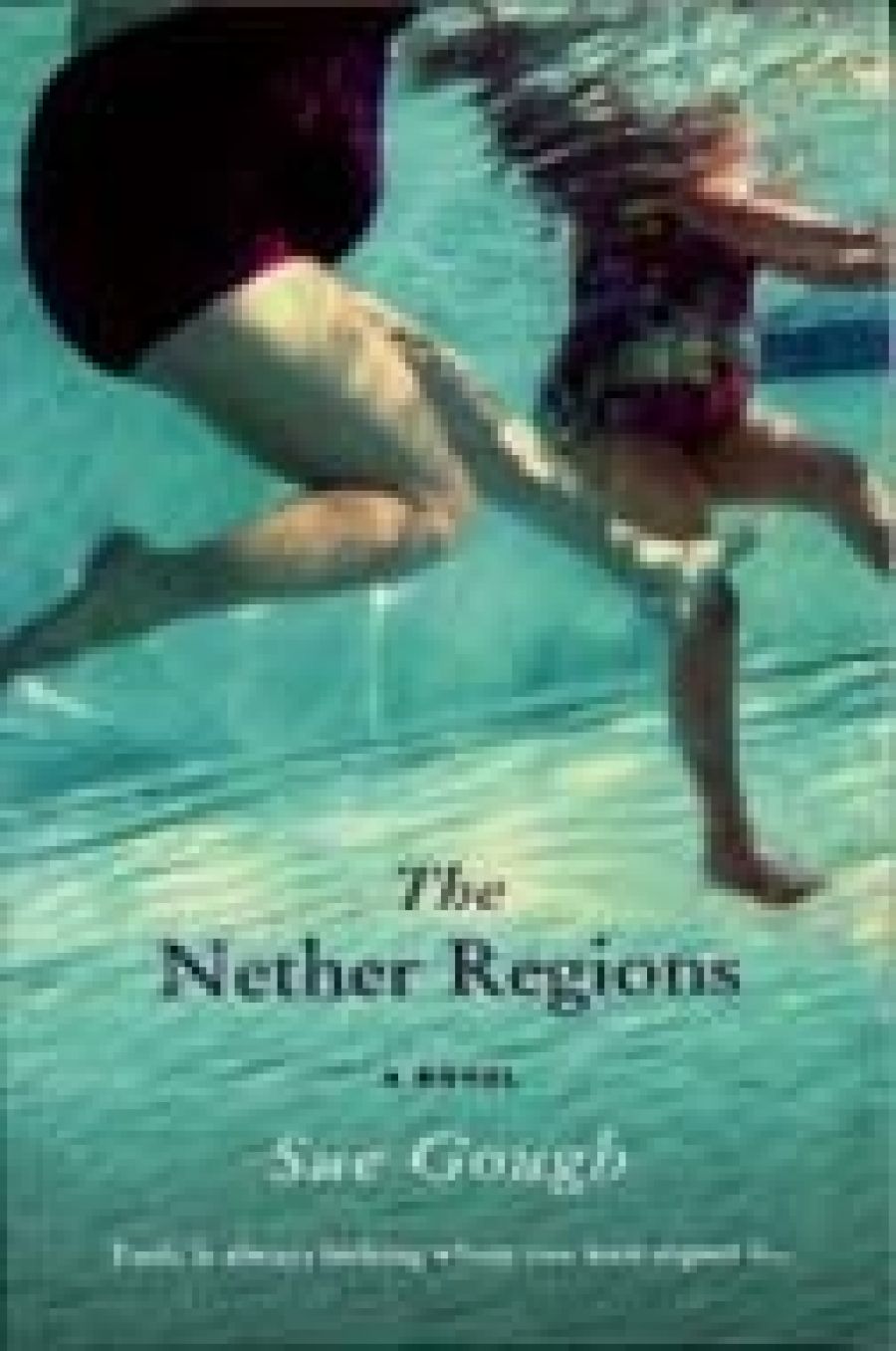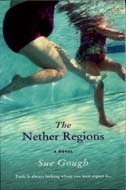
- Free Article: No
- Contents Category: Fiction
- Review Article: Yes
- Article Title: Four-Letter Therapies
- Online Only: No
- Custom Highlight Text:
Poisonous, profiteering physiotherapist Sue Mindberry is making a packet by charging seven gullible, fifty plus women $1000 per head for thirteen three-hour sessions of hydrotherapy. They are variously brain-damaged, hugely obese, psychically astray and arthritic. Sue Gough believes with Germaine that even such as these do not deserve the invisibility that age is supposed to confer. She gives them each a story – or rather, stories – invented by Beverley, a stroke victim, who hates her post-traumatic paralysis so much that she tries to disappear into the imagined lives of her fellow sufferers in the pool (its roof rolled back so that as they lie in the water supported by floaties each can identify with her own personal star or goddess).
- Book 1 Title: The Nether Regions
- Book 1 Biblio: Picador, $21 pb, 321 pp
- Book 1 Cover Small (400 x 600):

- Book 1 Cover (800 x 1200):

Gough is also at one with her character Carla, who believes that women who say ‘fuck’ every so often are more fun than those who don’t. The novel is stuffed with ‘bum’, ‘fart’, ‘shit’, and ‘fuck’, all designed to show that women of a certain age are not beyond using a hedonistic vocabulary. Nor are they incapable of mayhem, blasphemy or murdering their husbands, although they need the facilitator Beverley to create their (her?) fantasies for them. (Beverley, by the way, is described by her own creator as a kind of indomitable Everywoman: ‘flawed, brave, cynical and naïve.’)
Beverley, for example, gives Carla – she of the huge bum, spondylitis, and vertigo – two incarnations. First, she is a food journalist with a passionate Italian husband. Unfortunately, Carla would prefer to sleep in her own bed and fart into her own sheets. As an alternative, at a food awards dinner, she releases in the direction of her irritating co-speaker a ‘silent and deadly piece of chemical information’, her ammunition provided by a lunch of pistou soup. In her own speech, she goes ‘from outrageous to worse’, telling the guests that food and sex generate similar pleasures. ‘After the eye contact, and the aroma, there;s the involuntary wetness in the mouth, followed by the brief tussle with one’s better self, and the inevitable giving into temptation, say to a profiterole …’ Provocative stuff, she admits, which has her audience rolling in the aisles – except for her husband, Vicente, who leaves and is later discovered sleeping in the spare room. They have a tussle involving a croquembouche mold, with which Carla inadvertently hits herself on the nose and loses her sense of smell.
A little tame in spite of the hilarity? In the subsequent version of Carla, Beverley offloads Vicente and gives her a wealthy new husband who is inordinately shocked when Carla starts shoplifting. Carla puts a drowsy bee in the honey she spreads thickly on his toast and tops it with creme fraiche. Allergic to beestings, Geoffrey dies, while the doctor earnestly urges Carla not to blame herself.
A more complex invention is allotted to Merle, whose language and demeanor in the hydrotherapy pool are like something out of a boys’ own book of sex and lavatory jokes. In the ingenious story Beverley invents for her, Merle speaks, without warning and in the first person, as an orangutan in the Malayan jungle, although this is not actually explained until the beginning of the next chapter. The story also contains allusions to mutated genes, which may (possibly) explain why Merle is there to play alter-ego roles. Not only does she represent Beverley’s id, her ‘quicksilver link with the nether regions’ – when Gough has them all choosing a goddess, Merle opts for the Madonna, because she likes the way Mary puts her hand between her legs – it was during a pre-therapy, near-death experience that Merle met her own alter ego in the person of Liza Minelli. Liza asked, ‘What the fuck did ya think ya wuz given a body for? ... Ya wuz even, at long fuckin’ last, beginnin’ to get the hang of it. And watcha do? Treated the opportunity with con-tempt… like a snotty housewife passing up a pass from the milkman…’ Recovering, Merle told her husband in a strange accent that he was a ‘fuckin dumbshit’ and tried to dance down the stairs. The fall on her head reduced her to the brain-injured character we encounter in the pool.
I am not sure that ABR readers will jump at the opportunity to read Gough’s novel. I am sure that collectively they are as sympathetic to disability and as disapproving of ageism as any other audience, but, unlike a wide swathe of readers who will no doubt relish Gough’s women, they may prefer to read about different therapies for stroke victims than the stories devised by this ‘latter day Scheherazade’ from her ‘eccentrically rambling Queenslander’.


Comments powered by CComment